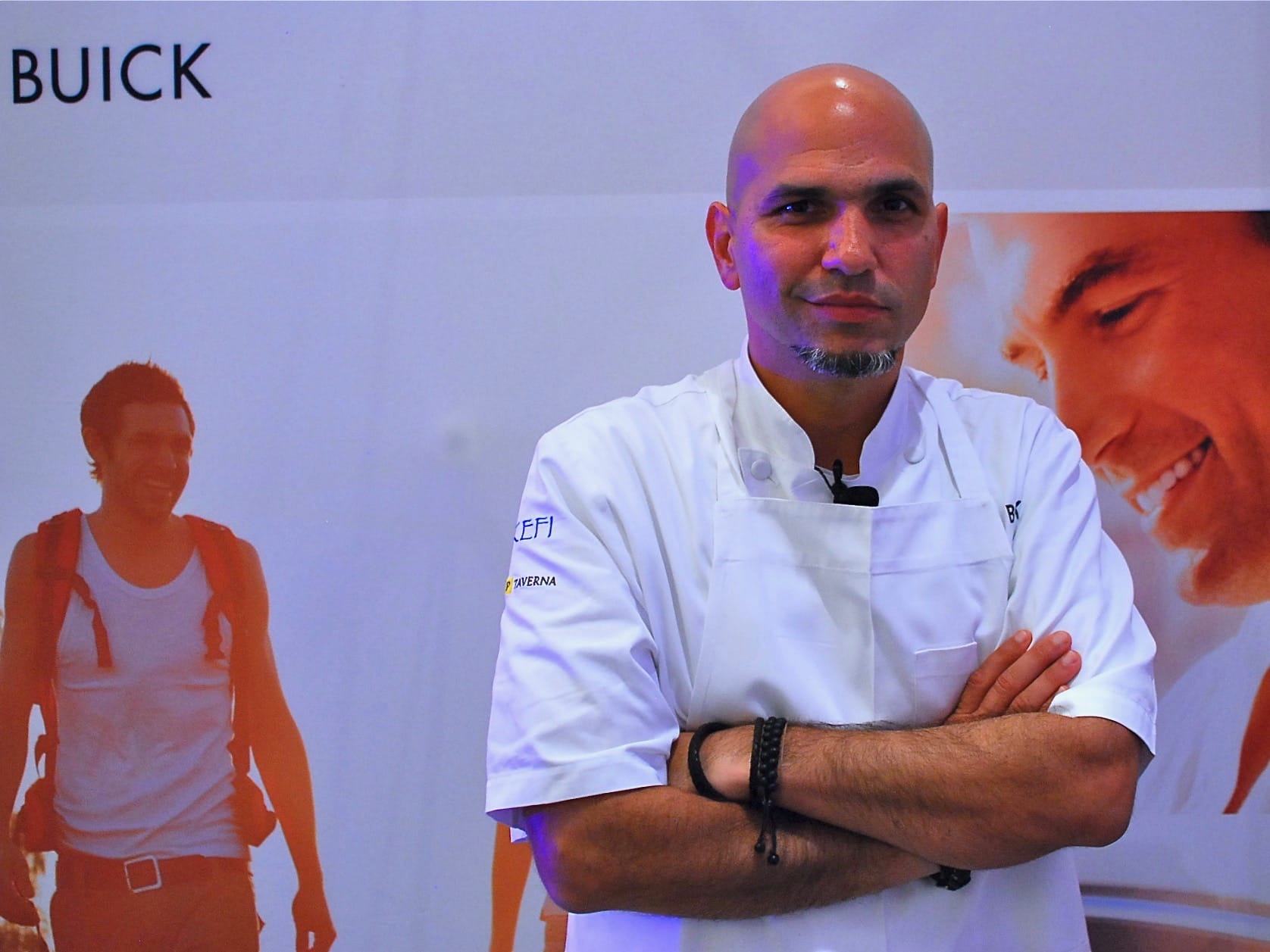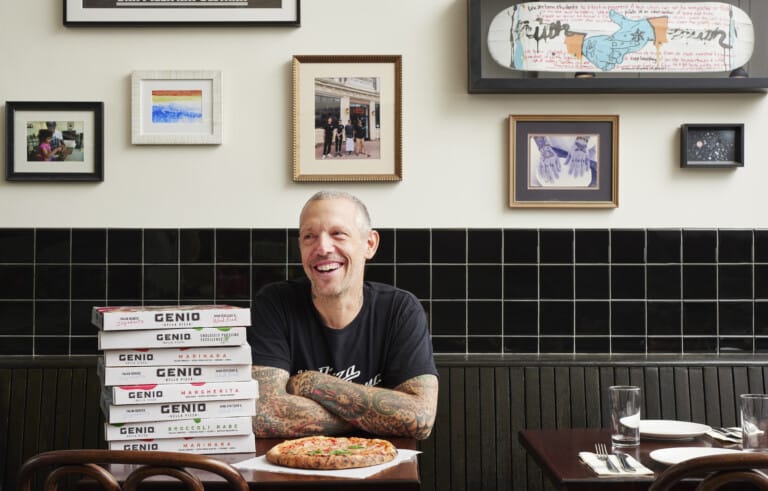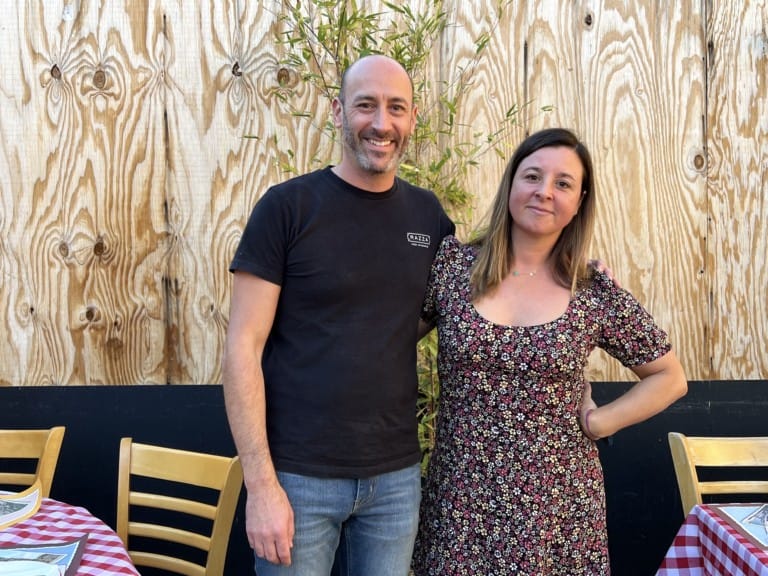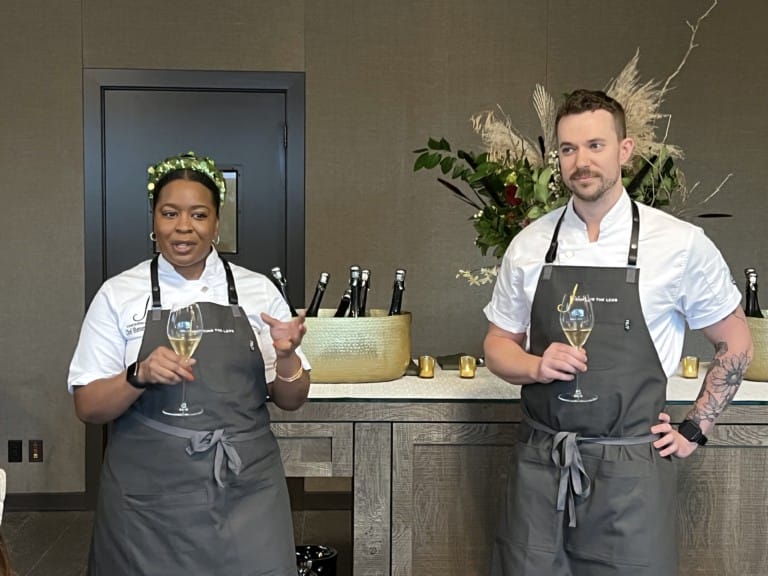Native New Yorker and one-time accountant Michael Psilakis first entered a professional kitchen at Café Angelica on Long Island, when his executive chef failed to report to work…absconding with several employees to secretly open his own restaurant. Psilakis drew on family cooking lessons from childhood and quickly found his comfort zone, and a new direction. He entered the Manhattan restaurant world with Ecco and grew an increasingly sophisticated restaurant empire with business partner and restaurateur Donatella Arpaia. He parted with Arpaia in 2010 and went in a more rustic direction with his cooking, trading the refined cuisine of restaurants like Anthos for his current trio: Kefi, MP Taverna and Fishtag. We met at the SLS Hotel on January 22, and he presented a meatball cooking demo with a personal bent as part of the Buick Discovery Tour. After he signed copies of How to Roast a Lamb and took photos with admirers, he shared culinary insights.
What was the very first night like for you, working in the kitchen for the chef who didn’t report?
It was a nightmare. It was mostly filled with anger, and resentment, and distrust, and all these emotions that were all negative. The one saving grace, really, was that as soon as I went back and started cooking, everything started to be brighter. It calmed me down, it was therapeutic, and I’ve always used food, even in the home kitchen, as a vehicle to relax myself. I’ve always enjoyed doing it, but home cooking and professional cooking in the kitchen, are always very different. It took awhile for me to get used to cooking on a professional level, in a kitchen, but it’s still that same sort of therapeutic end result, where you can kind of lose yourself in the food. I think anybody who’s a home cook understands what that means. You get to that really safe, fun place, and everything that’s going on in your life, all that baggage that you carry around all the time, gets put to the side for that moment. It’s just utopia, those moments.
How did you come to own your first restaurant while you were working as an accountant?
Actually, I left. I was getting ready to go to law school, and started working as a waiter. As soon as I fell into the restaurant, I knew that this is what I wanted to do. Law school was going to be a distant memory very, very soon. It was as if I was home when I walked into the restaurant. It was bringing people food, making them happy. Serving them was just something that was conditioned in me from young. It was part of our home culture, having people over and feeding them was something that my mother and father both enjoyed doing. We did often, meaning all the time. Every weekend it was 30, 40 people at our house, easily. There were six of us in our family. Food was not only part of our daily life, but part of our souls and our being. There was an immediate kinship with restaurants and me. The irony is that many, many Greeks have restaurants, my father being one that didn’t. I never was in the restaurant industry. We really never went out to eat. My mother cooked at home every single night, and it was rare. I can’t count the number of times we went out to dinner with my family on one hand. It was literally that few, but it was an immediate love. When I went into the kitchen, it was, “Okay, this is what I was supposed to do.” People often ask me, “How do you do this?” And I tell them, “I just know how.” I don’t know why. I just do. It’s just something that came easy to me, very natural to me. It’s just something that made sense in my mind. When you coupled that with it being my place, my utopian place, I don’t know if there’s a better job in the world than that.
What was the first restaurant?
The first, first restaurant was a place out on Long Island called Café Angelica, and I worked with my wife there in the front of the house for many, many years, and when I jumped back into the kitchen, it remained Café Angelica for about a year, maybe a year-and-a-half. During that time, I really started to challenge myself culinarily, and I was cooking some really good food. We had an Italian trattoria, and the dishes I was making were a little bit above the restaurant that we had, so I closed the restaurant and reopened it as another restaurant called Ecco, which was a much more formal northern Italian restaurant, and there I was really fusing Greek and Italian, to be honest. It was taking flavors that my mother cooked with and I knew and recognized, and doing them with Italian ingredients. I was making Bolognese with cinnamon in it. People would ask, “What is that thing?” I would tell them cinnamon and they wouldn’t believe it because the use of cinnamon in the States was really delegated more toward sweet than savory. If you go back many years, Indian food and Greek food and ethnic food was not nearly as popular. Food Network did not exist. These blogs about food, they just weren’t around yet. People now, because of you guys, have become so much more educated about food, and so much more willing to try many things, that it’s allowed us in the kitchen to push the envelope and break new boundaries. In the early part of my career, it was harder. People were hesitant to try something new. When I opened my first restaurant in Manhattan, it was Onera, and it almost didn’t make it. It was probably a couple months from closing, because it just wasn’t making any money. If I hadn’t gotten reviewed by the Times when I did, I probably wouldn’t be sitting here with you today.
What do you look for when you’re hiring somebody to work in one of your kitchens?
Honestly, it’s always the same thing. I referenced here in my demo. Is this the one thing you really love? I don’t phrase it that way, but that’s the one thing I’m looking for. I ask them what they’re interested in doing, and if their response – and there’s only one correct response – is not cooking, then you shouldn’t go into the kitchen. It’s not going to be for you, at least my restaurants. You can have cooking as a profession, or you could have cooking as a love. Cooking as a profession, alone, is not enough to be great in a kitchen. You can make a living doing it, but that doesn’t necessarily mean you’re going to be good or great at it. You have to have some sort of intrinsic love or kinship to whatever it is that you’re doing to have greatness as a possibility. Another great chef that I know said, “We’re not training cooks. We’re training chefs in the kitchen.”
Do you see signature dishes as a positive?
It depends…No is the chef in me that wants to cook very articulate, cerebral food. Yes is the chef in me that wants people to come back and just experience the memories like I spoke about today. If you’re thinking about being a critically acclaimed chef where you’re cooking highly evolved food that’s breaking new boundaries, then the idea of a signature dish sort of goes against it. It’s an oxymoron, almost, because you’re saying that you’re giving up. You’re saying that this is the best that I can do with this scallop. When I was cooking that style of food – and I don’t do it anymore – I would take things off the menu and they would be angry. They’d be like, “How could you take this off the menu?” I would say to them, “Well, I don’t want you to come back and just eat that thing. That’s not what this restaurant is about. This restaurant is about what my mind is telling me. I can change, just like you. Think about music. Think about a musician like Sting. In the beginning of his career, he was a punk rock guy, and towards the end of his career, he was doing jazz. That’s the beauty of his evolution. We got to see how he interpreted his life and his memories and genius and imagination through his music. That was his vehicle. What was cool about that was as he grew, his likes and interests changed, and so did his music. I think the same thing is true of a chef. It’s the same vehicle, just different muses.
What are the top selling dishes at each of your restaurants, and why do you think that’s the case?
When people go to a Greek restaurant, they think lamb and they think fish. Grilled fish, very simple, olive oil, lemon juice, oregano. Always my top seller. Probably branzino, across the board, Mediterranean sea bass, simply grilled. We serve it with tomatoes that are slow roasted, olives and potatoes, just a little fresh olive oil, a squeeze of lemon juice and fresh herbs on top. We sell a lot of that dish. And then lamb shank, in the wintertime. Grilled lamb chops in the summertime. They’re second, but a distant second, to the real open flame wood-grilled fish. Just can’t beat it.
This is across the board for all your restaurants?
Right now, I have three restaurants in my portfolio. Kefi is a restaurant that is sort of the most traditional, even though the food we’re cooking is what I’d call first generation Greek. It’s taking my Greek background, my mother’s food, and incorporating my American nationality into it and creating dishes that are sort of a hybrid of those two things. It’s fusion Greek, ironically, but we’re fusing it with American cooking. Then I have a wine bar called Fishtag, and there the food is a little bit more involved, not nearly what I was cooking at Anthos, but just fun, 80 wines by the glass, 100 beers, a full back bar, just smaller plates that you eat and is meant to be paired with spirit. The menu’s even organized in a way where we’re grouping dishes based on flavor profiles and how well they pair with certain things, as opposed to any kind of traditional format. It’s just a laundry list of ingredients that are basically starting at the lightest – in terms of its flavor profile –and then in ascending order to the fullest, heaviest and boldest flavor profile. There are graphics that associate what kind of beverage you would drink in each one of these categories, which is pretty interesting if you like food and pairings.
If you could only cook with one more protein, what would it be and how come?









Leave a Comment